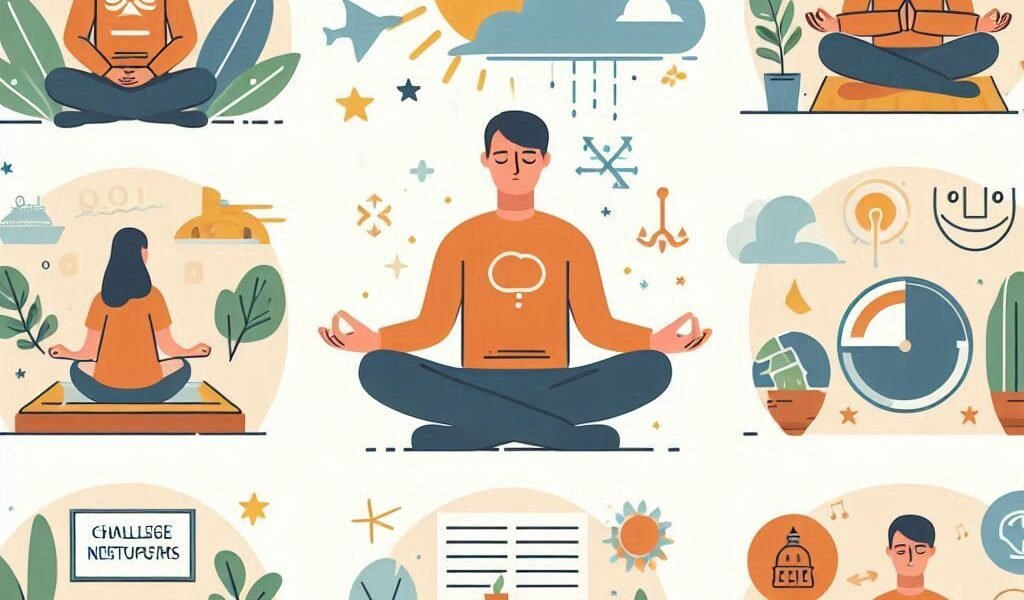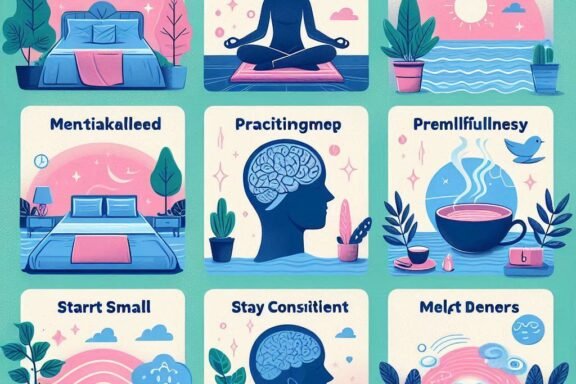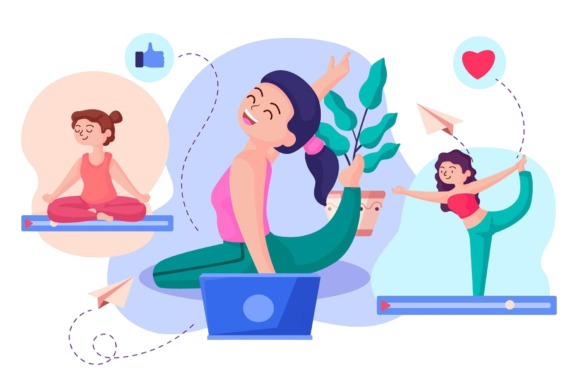Managing Anxiety Through Lifestyle Choices and Self-Care: A Path to Inner Peace
Anxiety is a common struggle in today’s fast-paced world, where demands from work, social media, and personal expectations often feel overwhelming. The feeling of constant worry, fear, or unease can interfere with daily life, affecting both mental and physical health. While anxiety can sometimes feel uncontrollable, there are powerful strategies you can implement into your lifestyle and self-care routine that can help reduce its grip on your life.
In this blog, we will explore practical and sustainable approaches to managing anxiety through intentional lifestyle choices and consistent self-care practices. These methods empower you to regain control over your mind and body, paving the way to a calmer, more peaceful life.
1. Understanding Anxiety: The Root Causes and the Role of Lifestyle
Anxiety isn’t just a passing feeling of nervousness—it’s a complex emotional response that can be triggered by various factors, including stress, trauma, genetics, or lifestyle choices. It manifests physically, affecting your heart rate, breathing, and energy levels. Understanding that anxiety is not just a “mental issue” but a mind-body connection is the first step toward managing it effectively.
The Link Between Lifestyle and Anxiety
Lifestyle factors such as poor sleep, unhealthy eating, lack of physical activity, and chronic stress can exacerbate anxiety. On the other hand, adopting a healthy lifestyle that prioritizes rest, nutrition, and movement can help alleviate anxiety and improve overall mental well-being.
By making small but impactful changes in your daily habits, you can reduce the triggers that contribute to anxiety, giving you the tools to navigate stress more effectively.
2. Creating a Calming Lifestyle: How Daily Habits Can Ease Anxiety
While it may not be possible to completely eliminate anxiety, incorporating healthy habits into your lifestyle can help you manage symptoms and reduce their impact on your life. Here are some practical lifestyle changes that can make a significant difference:
A. Prioritize Quality Sleep
Sleep and anxiety are deeply interconnected. Chronic sleep deprivation can worsen anxiety symptoms, leading to a vicious cycle of sleeplessness and heightened stress. To break this cycle, it’s important to establish healthy sleep habits:
- Set a consistent sleep schedule, going to bed and waking up at the same time each day.
- Create a calming bedtime routine—dim the lights, avoid screens, and perhaps read a book or listen to soothing music before bed.
- Make your bedroom a peaceful sanctuary—keep it dark, quiet, and cool to promote better rest.
B. Exercise Regularly
Physical activity is a powerful tool for combating anxiety. Exercise releases endorphins, the body’s natural “feel-good” hormones, which help reduce stress and elevate mood. Regular movement, even in the form of gentle activities like walking, yoga, or stretching, can help calm your nervous system and improve mental clarity.
- Yoga and Tai Chi are particularly effective for managing anxiety as they combine gentle movement with mindful breathing, which can help reduce the physical tension often associated with anxiety.
- Aerobic exercises, such as running, cycling, or swimming, increase heart rate and help release pent-up stress, leading to reduced feelings of anxiety.
C. Healthy Eating to Support Mental Health
What you eat plays a crucial role in your emotional well-being. A balanced diet filled with nutrient-dense foods can support brain function, stabilize mood, and improve overall mental clarity.
- Omega-3 fatty acids, found in fatty fish (like salmon) and plant-based sources (like chia seeds), are known to improve mood regulation and reduce anxiety.
- Complex carbohydrates (like whole grains and vegetables) help stabilize blood sugar levels, which can prevent mood swings and irritability.
- Magnesium-rich foods, such as leafy greens, nuts, and seeds, support the nervous system and promote relaxation.
Avoiding excessive caffeine, sugar, and processed foods can also prevent spikes in anxiety. These foods can disrupt blood sugar levels and trigger mood fluctuations, exacerbating feelings of unease.
D. Limit Stress Through Time Management and Boundaries
Chronic stress is one of the leading triggers of anxiety. Learning to manage stress effectively can have a profound impact on reducing anxiety. You can do this by:
- Setting boundaries at work and in your personal life. Avoid taking on too many commitments and practice saying no when necessary.
- Time-blocking to ensure you have time for work, relaxation, and socializing without feeling overwhelmed.
- Delegating tasks and asking for help when needed to lighten your load.
- Mindful time management practices can help you stay organized and focused, preventing the anxiety that comes with feeling scattered or behind.
3. The Power of Self-Care: Nurturing Your Mind, Body, and Spirit
Self-care is more than just a buzzword—it’s an essential practice for maintaining your mental and emotional well-being, especially when dealing with anxiety. By dedicating time to activities that nourish your body and soul, you can create a foundation of peace and calm in your life.
A. Mindfulness and Meditation
One of the most effective self-care practices for reducing anxiety is mindfulness meditation. Mindfulness involves paying attention to the present moment without judgment, which helps to interrupt the cycle of anxious thoughts. Regular meditation can help you develop a sense of inner calm, reducing the impact of stress and anxiety.
- Start with just 5-10 minutes each day and gradually increase the time as you become more comfortable.
- Deep breathing exercises, such as diaphragmatic breathing or 4-7-8 breathing, can also help activate the body’s relaxation response, reducing anxiety in moments of stress.
B. Journaling for Clarity and Emotional Release
Journaling is a powerful tool for managing anxiety and processing overwhelming emotions. By writing down your thoughts, fears, and worries, you give yourself a safe space to express what’s on your mind. This practice can help you gain perspective on your feelings and reduce the intensity of anxiety.
- Consider writing down what you’re grateful for each day, as gratitude has been shown to reduce feelings of stress and anxiety.
- Cognitive Behavioral Therapy (CBT) journaling can also be helpful. Write down the anxious thoughts you experience, then challenge them with rational, balanced alternatives.
C. Engage in Relaxing Activities
Relaxation is a vital part of self-care. When anxiety takes hold, it’s essential to engage in activities that help your body and mind relax. These might include:
- Taking a warm bath with Epsom salts to relieve tension.
- Practicing gentle stretching or yoga to release physical tension.
- Listening to calming music or sounds of nature.
- Spending time in nature, such as going for a walk in the park, hiking, or simply sitting outside.
D. Building a Support System
Having a support network is vital when it comes to managing anxiety. Surround yourself with people who uplift you and make you feel safe. Don’t hesitate to talk openly about your feelings with friends, family, or a therapist. Sometimes just talking through your anxiety can reduce its hold on you.
4. Mindful Daily Routines: Creating Lasting Change
The key to managing anxiety is consistency. Anxiety doesn’t disappear overnight, but by integrating mindful lifestyle habits and self-care practices into your daily routine, you build resilience over time. Here are a few suggestions for creating a balanced, sustainable routine that supports anxiety management:
- Morning Routine: Start your day with a calming ritual. This could be meditation, a healthy breakfast, or a short walk. Setting a positive tone in the morning can help reduce anxiety throughout the day.
- Workday Strategies: Incorporate short breaks into your workday to clear your mind. A few minutes of deep breathing or a short walk can do wonders for relieving stress.
- Evening Routine: Wind down in the evening by engaging in a relaxing activity, such as reading, taking a bath, or journaling. Creating a calming pre-bedtime routine helps prepare your body and mind for restful sleep.
By consistently incorporating these habits into your daily life, you can gradually reduce anxiety and build a lifestyle that supports long-term mental and emotional well-being.
Conclusion: A Holistic Approach to Managing Anxiety
Anxiety is a challenging emotion, but it doesn’t have to control your life. By making intentional lifestyle choices and dedicating time to self-care, you can significantly reduce its impact. Prioritizing sleep, exercise, healthy eating, and mindfulness practices will help you build resilience against stress and anxiety, allowing you to navigate life with greater ease and peace.
Remember, managing anxiety is a journey, not a destination. Take small steps each day toward a more balanced and mindful life. Over time, these consistent efforts will help you develop the strength and tools to handle life’s challenges with confidence and inner peace.







No Comments